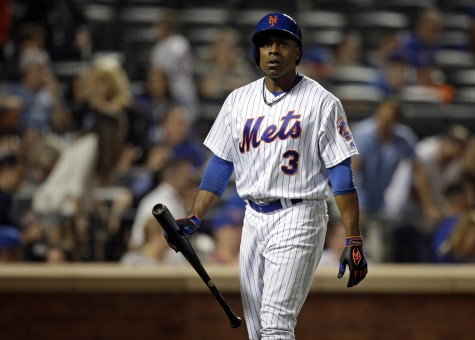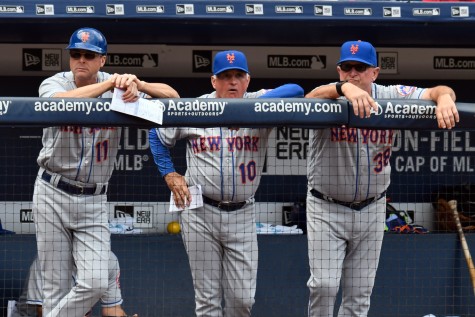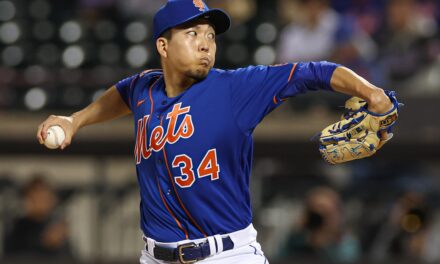
Marc Carig of Newsday tweeted the following yesterday:
“In short: the Mets have been so horrendously unclutch that it’s hard to think they could sustain that level of crappiness.”
Carig was referring of course to an article by Jeff Sullivan of Fangraphs detailing just how “unclutch” the Mets have been. Clutch, as calculated on Fangraphs, measures how well a player (or team) perform in high leverage situations. It’s calculated as such: Clutch = (WPA / pLI) – WPA/LI
David Appelman defines it as: “How much better or worse a player does in high leverage situations than he would have done in a context neutral environment.” Sullivan concluded: “Offensively speaking, the Mets have been impossibly unclutch. It shouldn’t continue like this. Of course, what’s done is done.”
Per Sullivan, in April, Mets hitters ranked 29th in Clutch. In May, 22nd. In June, they were 29th. Overall, they’re dead last, and it’s not very close.
The Mets’ current run of unclutch play is, in fact, historic, as you can see in the chart below listing the 10 most unclutch seasons over the past 40 odd years.
10 Least Clutch Offenses
|
Team |
Season |
G |
Clutch/162 |
| Mets |
2016 |
77 |
-10.9 |
| Padres |
1994 |
117 |
-9.0 |
| Twins |
1978 |
162 |
-8.5 |
| Indians |
2005 |
162 |
-7.6 |
| Yankees |
1981 |
107 |
-7.4 |
| Dodgers |
1989 |
160 |
-7.2 |
| Angels |
1981 |
110 |
-7.2 |
| Orioles |
2004 |
162 |
-7.2 |
| Expos |
1983 |
163 |
-6.9 |
| Giants |
2002 |
162 |
-6.9 |
It gets worse … Sullivan goes on to note:
“My stat of choice is tOPS+, which measures split performance vs. overall performance. By this measure, the worst team in recorded history with runners in scoring position is the 1962 Mets, who finished with a tOPS+ of 77. The 1987 Indians finished with a tOPS+ of 80. As I write this, this year’s Mets have a tOPS+ of 74.”
That’s pretty bad folks, unsustainably bad, which is to say, it is extremely unlikely that the Mets will continue to perform this poorly in high leverage situations. But the article looks at this phenomenon from a decidedly statistical aspect. Statheads, for the most part, believe that clutch is not sustainable, clutch performances are simply random fluctuations in performance where successes happen to coincide with high leverage situations. So Alex Rodriguez was never really unclutch in the playoffs, he simply hadn’t had enough at bats … something like that.
So if clutch isn’t “real” in this sense, how do you explain the fact that some teams and some players clearly perform better in high leverage situations? You don’t, it’s simply a function of performance and context, a 900 OPS player isn’t considered clutch if he puts up a 900 OPS in a given playoff series.
Now a .770 OPS player who puts up a 1.850 OPS during the playoffs (Daniel Murphy) would be the definition of clutch, right? Well, yes and no. The fact that he rose above career averages in a high leverage environment and sustained it more or less for an entire post season is certainly the definition of “clutch,” however, you could argue that the talent was always there, it simply hadn’t been realized … Murphy’s performance since then would certainly support this conclusion.
There’s nothing wrong with saying a given hit was “clutch” because it scored a winning run, but to say that a player is intrinsically “clutch” because he has a knack for hitting with runners in scoring position is (at least according to some) presumptuous, because it may simply be a demonstration of that particular player’s natural ability randomly juxtaposed over high leverage contexts – a coincidence if you will.
The good news is Clutch (the stat) isn’t predictive. Sullivan took a bunch of notably unclutch first halves over the past 20 years and drew a correlation scatter with those same teams’ second halves and there was absolutely no correlation. An “unclutch” first half is not even in the slightest way predictive of an unclutch second half. Sometimes teams simply under-perform, sometimes they go through unbelievable stretches of bad luck, sometimes hitters slump. So the Mets are probably not as bad at they appear.

But while Clutch tells us nothing about the future and little about the present, it can certainly be used to qualify the past, and as such, the Mets have indeed been “impossibly unclutch.” When you have these extraordinary unlikely scenarios repeating over and over for weeks and months you invariably have to wonder how much of it is bad luck and how much is bad talent.
Sullivan pointed out that according to BaseRuns, the Mets should be averaging 4.07 runs scored per game. They are currently at 3.58, giving them a difference of -0.49. That happens to be the biggest negative difference in Baseball, and, it works out to about 38 missing runs (which amounts to around four wins). On paper, the Mets should be better, and as a team, it’s hard to avoid the specter of underperformance. The Mets have been atrocious at sequencing hits, they’ve hit tons of solo home runs and have left busloads of runners in scoring position. There are legitimate concerns that the team continues to stumble over it’s own misplaced parts.
The other question is whether the Mets offense, as constructed, somehow lends itself to excruciatingly bad runs like this current one. The value of improved plate discipline and selectivity (as an organizational tenet) is based on a preponderance of data, but do patient and selective lineups falter when they rely too much on the long ball? Does it become all too easy to pitch around the odd hot bat in a depleted lineup? Does the lack of team speed and contact hitting undermine even the most patient lineup’s ability to push runs across?
Whatever the myriad causes, this historic run of unclutch play shouldn’t continue. “What’s done is done.” Eventually the Mets will hit with runners in scoring position. Still, you can’t overlook just how bad this first half has been.
While things as unlikely as this level of ineptitude rarely occur (for this long) without some good reasons, waiting for the winds of change to somehow bolster the Mets’ fortunes seems naive.The Mets may be the most unlucky team in baseball for all we know, but the 2016 Mets, very much like the 2015 Mets, have some significant offensive shortcomings, and much like the 2015 Mets they’re going to need to improve their offense in some tangible ways if they intend to stay in the thick of the playoff hunt.
Waiting for the inevitable odds that say the Mets will hit with runners in scoring position to catch up with events on the field seems like an affront to a fickle pantheon of baseball deities who could just as easily make it so the Mets continue their historic futility. Stranger things have happened.















